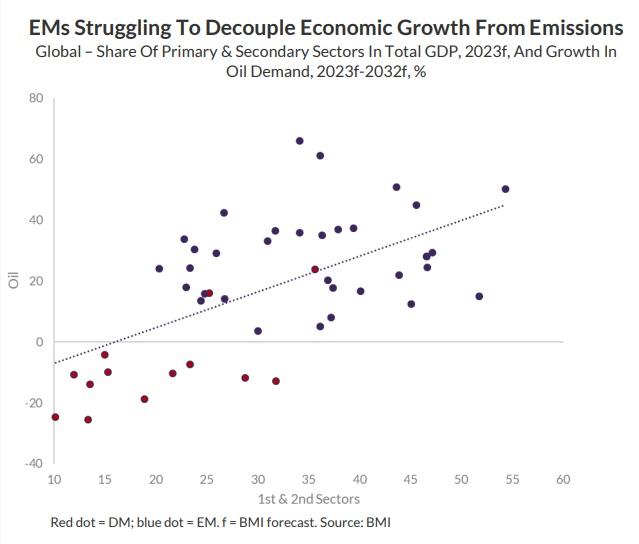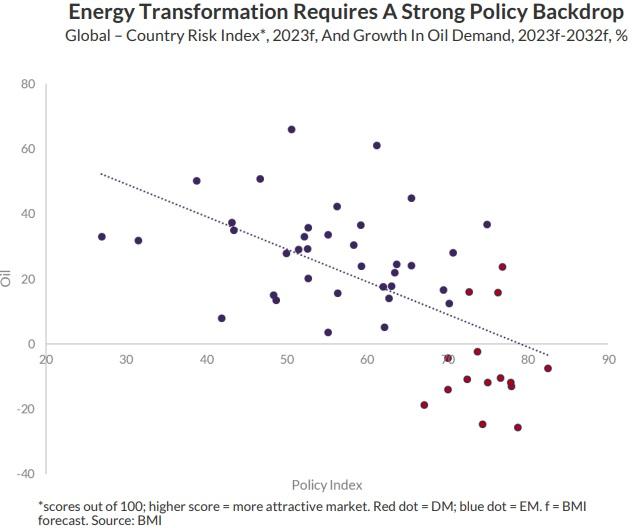
Joseph Markman, Hart Energy
HOUSTON
EnergiesNet.com 10 13 2023
I shall be writing this with a sigh, somewhere ages and ages hence: two pathways diverged in the energy transition and the world—the world took the one most traveled by, and that has made all the difference. For the worse.
My inspiration for that grotesque twist on a beautifully written poem is probably that it is 99 degrees outside and I’d rather dwell on something cool, like Frost.
Also, that I am staring at two charts, both from BMI, that illustrate the divergence of pathways toward the energy transition. The first tracks consumption of oil and gas if countries around the world follow one potential pathway to net zero emissions by 2050.

While demand from the industrial sector is resilient, demand falters in transport, residential and commercial and power. In road transport alone, consumption is forecast to drop by 75%, according to BMI researchers. This pathway also assumes a significant reduction in the carbon intensity of the remaining oil and gas supply versus current levels. So, EVs plus CCUS equals A-OK.
Sort of. Even if this pathway is taken, there will be enough residual emissions to compel the sector to pursue carbon offsets to reach net zero, says BMI, which is part of Fitch Solutions.
“As you probably guessed, that’s not the pathway that we’re currently on,” Emma Richards, associate director for oil and gas at BMI, said during the company’s “Towards 2050: Megatrends For Energy” webinar in August.
“The pathway that we’re on at the moment … shows rising oil and gas demand over the coming decade, leading to continued increase in global GHhG [greenhouse gas] emissions,” she said.

Sounds pretty good if you’re in the oil and gas biz which, as a writer for Oil and Gas Investor, includes me. But it’s not pretty good—it’s pretty lousy. The data show the carbon budget allotted to the oil and gas sector will be exhausted pretty rapidly, Richards said. If the Paris agreement continues to be the goal, there will be some pretty sizable shifts in global climate policy within the coming decade.
“But the thing is, the longer that we stay on our current trajectory, the wider that policy gap becomes, and the greater and more drastic the changes in policy will have to be further down the line,” she said. “And obviously that creates a very risky environment for companies to operate in.”
Enter the bogeymen and bogeywomen
There’s a common misperception among energy types that Russia’s invasion of Ukraine taught the world a lesson about energy security and the wise course is to back away from renewables, at least for now, and commit fully to fossil fuels.
There are good reasons for that thinking. No source outside of fossil fuels can deliver as much energy as cheaply. Oil and gas provide the quickest way to lift millions around the world out of energy poverty. And who are we in the industrialized West to scold emerging economies for using coal when our economies were built using that very fuel?
But even those who believe that global warming is a hoax—which somehow was the opinion of 7% of attendees at Hart Energy’s recent Carbon Management & ESG conference (albeit in an unscientific poll)—will find it easy to take seriously the possibility of “sizable shifts in global climate policy.”
Few bogeymen and bogeywomen are more feared than those designated as lawmakers and regulators.
BMI’s forecast for oil consumption is more bullish than the consensus, Richards said, because of what the research firm sees from emerging markets.
“The economic and demographic fundamentals are very different than developed markets,” she said. Populations are expanding but energy access is often still quite poor. Growth prospects are tied to more energy-intensive sectors of the economy.
That would seem to be good reason to bet on oil and gas growth in these countries, but maybe not. Remember the whole “sizable shifts in global climate policy” thing.
“In markets where current climate policies are relatively weak, it often coincides with a higher level of political instability and broader institutional weaknesses,” Richards said. “From a company’s perspective, the best way to protect yourselves against these policy-related risks is to make sure that you are fully aligned with global net-zero goals.”
So, will the pathway change in the direction of the energy transition, or will we continue on the business-as-usual road? Robert Frost acknowledges the temptation to have it both ways at the start of his poem (“And sorry I could not travel both; And be one traveler, long I stood”).
But in the penultimate stanza, he affirms the inevitability of choice: “Yet knowing how way leads on to way, I doubted if I should ever come back.”
Moving a company to aggressively meet net-zero goals may present short-term risks, but it is, nevertheless, the road best taken.
hartenergy.com 10- 13 2023












